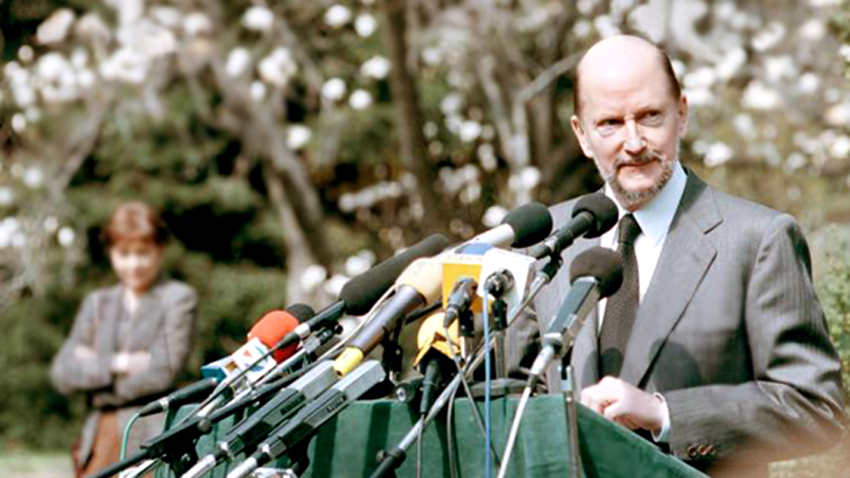The general elections in 2001 were a political watershed for Bulgaria. The victor, who put an end to the hitherto reigning bipolar model in the country’s most modern history, was the National Movement Simeon II, a party set up and headed by the Bulgarian tsar Simeon Saxe-Coburg-Gotha, back from exile. The electoral victory on 17 June was to a great extent due to the widespread disappointment over the painful reforms and the cost the nation had to pay, as well as to the populism of the people laying claim to the country’s administration, who promised a swift rise in living standards and “a new kind of morality and integrity above all else”.
On 6 April 2001, two months before the elections, Simeon Saxe-Coburg-Gotha made his notorious speech about the “800 days” which nobody seemed to have grasped, each understanding it in his or her own way.
 “Addressing you now, I am laying the foundations of the National Movement Simeon II, in the name of three principal ideas. First – a swift and qualitative change in the standard of living in this country, by attaining a functioning market economy and by increasing the inflow of appreciable world investments into Bulgaria. I am ready to propose a plan of economic measures and social-economic partnership with the help of which the famed Bulgarian industriousness and enterprise will change your lives in no more than 800 days. Second – breaking with political cliquism and uniting the Bulgarian nation around our fundamental ideals and values that have made it great through the ages. Third – introducing rules and institutions to eradicate corruption, something that has become Bulgaria’s arch enemy, reducing the nation to poverty and repulsing foreign capital.”
“Addressing you now, I am laying the foundations of the National Movement Simeon II, in the name of three principal ideas. First – a swift and qualitative change in the standard of living in this country, by attaining a functioning market economy and by increasing the inflow of appreciable world investments into Bulgaria. I am ready to propose a plan of economic measures and social-economic partnership with the help of which the famed Bulgarian industriousness and enterprise will change your lives in no more than 800 days. Second – breaking with political cliquism and uniting the Bulgarian nation around our fundamental ideals and values that have made it great through the ages. Third – introducing rules and institutions to eradicate corruption, something that has become Bulgaria’s arch enemy, reducing the nation to poverty and repulsing foreign capital.”
What Bulgarians liked was that industriousness was cited as the fundament of the change promised by the Saxe-Coburg-Gotha government and that corruption would be cut at the root. And they started an 800-day countdown for these promises to become reality. But disappointment was not late in coming with Simeon Saxe-Coburg-Gotha explaining later that the failure of his administration had been because “Bulgarians had the wrong chip in their heads”. He could not have known things would take such a turn on election night, when he was celebrating victory:
“The National Movement Simeon II will seek to govern in coalition with the political forces that share the principal ideas in our platform. Sustainable economic growth, a swift advance towards our goal of membership of the EU and NATO, ridding Bulgaria of corruption, increased responsibility for all people who shall exercise power in the country, a stable legislation meeting European standards.”
In spite of its landslide election victory, in order to implement its programme, the National Movement Simeon II was forced to seek coalition because it was just one MP short of a full parliamentary majority. The negotiations with the Union of Democratic Forces fell through and the Movement for Rights and Freedoms – the non-circumventable factor in Bulgarian politics – was selected as its coalition partner.
One other reason why the National Movement Simeon II won the elections was a plan it put forward with proposals, some of which did not sound bad at all – such as zero budget deficit, swift privatization, zero tax for profits reinvested etc. During the term of office of the Saxe-Coburg-Gotha cabinet, Bulgaria attained the two most important foreign policy objectives it had been striving for ever since 1990. In 2004 the country became a member of NATO and in 2005 it concluded its EU accession agreement.
But the international successes were accompanied by an overblown state administration, patronage, lack of reform in key public sectors, controversies over the privatization deals of the Bulgarian Telecommunications Company, Bulgartabac and power distribution companies. Nonetheless, snaking its way from success internationally to failure domestically, the government of Simeon Saxe-Coburg-Gotha managed a full term of office.
English version: Milena Daynova
On 25 January, 1935, Tsar Boris III signed the decree by force of which the Bulgarian National Radio was created. The man appointed head of broadcasting and first director of Radio Sofia, as it was then called, was Panayot Todorov..
“I am not at all fond of the word “legend”, I am a down-to-earth person and an artist. But if I would have to say something about it, it would be “I was recognized as the best basso cantabile in the world.” These words are from one..
2013 went down in the most modern history of Bulgaria as the year of protest. It was the protests that brought down the first GERB cabinet of PM Boyko Borissov, while the term of office of the bipartisan Bulgarian Socialist Party-Movement..

+359 2 9336 661
